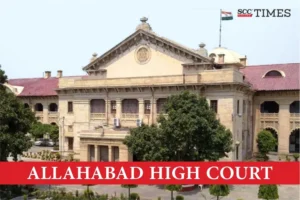Allahabad High Court: In a writ petition filed challenging the order passed by the District Magistrate/Collector (Stamp)on the ground that the collector (stamp) lacks the power to recall or review an order by him under Section 47 of the Stamp Act, 1899 (‘ISA’), Shekhar B. Saraf, J., while setting aside the impugned order, held that the collector (stamp) acting as a quasi-judicial authority does not possess any power, inherent or statutory, to recall/review an order passed under Section 47-A of the Act. Therefore, the exercise of review carried out by the Collector (Stamp) is bad in law.
Background
The petitioners purchased 0.216 hectares of agricultural land in Jaunpur from Sandeep Kumar on 23-07 2020 for Rs. 1,20,00,000 and paid Rs. 1,25,280 for registration fees. The Sub Registrar registered the sale deed the same day and later reported a stamp duty deficiency of Rs. 4,45,790 and a registration fee deficiency of Rs. 63,690 on 14-09- 2020. A stamp case was registered, and the petitioners agreed to pay the amount to avoid penalties. On 9-12-2020, the Collector (Stamp) also imposed a Rs. 25,000 penalty which the petitioners paid on 18-12-2020.
On 23-12-2020, X filed a complaint to recall the 09-12-2020 order, and based on it the collector (stamp) issued another notice to the petitioners on 31-12-2020. The petitioners objected and argued that the 09-12-2020 order was final and not ex-parte. Subsequently, the collector(stamp) issued a new order on 03-02-2023, which is now being challenged in this writ petition.
Issue:
Whether the collector (stamp) who acts as a quasi-judicial authority possess any power, inherent or statutory, to recall/review an order passed under Section 47-A of the Act?
Analysis and decision:
Upon perusing the Act, the Court noted that no such power to review the order is granted to the collector After referring to various judgments, the Court concluded that the collector (stamp) cannot recall or review his own order as no such power has been conferred under Section 47-A of the Act. A quasi-judicial authority is limited in its functionality in as much as it has to act within the four corners of the statute from which it derives its authority. If the statute does not provide for a particular act, the same cannot be undertaken by that authority. Any such action taken de hors the legislative intent would amount to an overreach and beyond the power of the said authority
The Court said that quasi-judicial authorities must strictly adhere to their statutory powers and cannot exceed them. Unlike Constitutional Courts, which derive their powers directly from the Constitution of India and possess inherent review powers, quasi-judicial authorities only have the powers expressly conferred by their governing statutes. This limitation preserves the integrity of the legislative scheme and ensures adherence to the principle of separation of powers. Any action by quasi-judicial authorities to review or recall orders without statutory authorization is invalid from the outset. While the legislature may grant limited review powers to certain quasi-judicial bodies, expanding beyond the statute undermines legislative supremacy and judicial independence. Therefore, quasi-judicial authorities must exercise caution and restraint in revisiting their decisions.
The Court further said that the rationale behind limiting the review powers of quasi-judicial authorities lies in ensuring adherence to the principle of separation of powers and preserving the integrity of the legislative scheme. Quasi-judicial authorities, being creatures of statute, must operate within the boundaries set forth by the legislature and therefore they cannot exceed their statutory mandate. Any attempt by quasi-judicial authorities to exercise the power of review or recall outside the bounds of statutory authorization is inherently flawed and constitutes a usurpation of judicial authority. Such exercises of power are void ab initio, meaning they are null and void from the outset, and cannot be sustained in law.
Thus, the Court set aside the impugned order.
[Shivani Chaurasia v. State of U.P., 2024 SCC OnLine All 1685, order dated 17-5-2024]
Advocates who appeared in this case:
Counsel for the Petitioner: Advocate Sanjay Goswami
Counsel for the Respondent: Standing Counsel Siddhartha Singh

